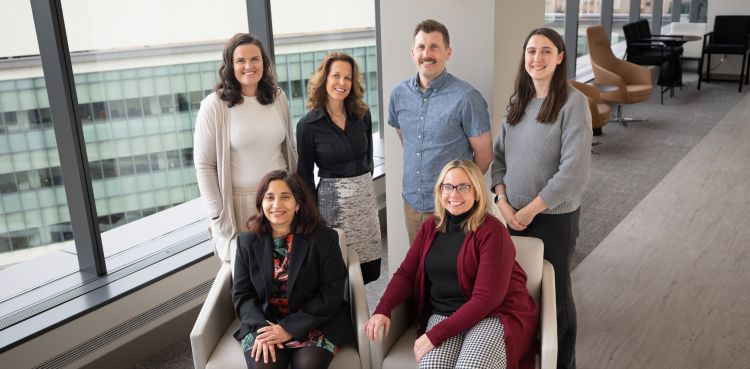Grateful patient gift enables expansion of the UW PKD Program under Dr. Gauri Bhutani
Philanthropy at work in the Department of Medicine

The University of Wisconsin Polycystic Kidney Disease (UW PKD) Program will be able to improve its reach to patients statewide and strengthen research contributions nationally, thanks to a generous gift by Patrick Flesch and the Gordon Flesch Foundation.
This vital new administrative role, held by Tricia Gervasi, project program manager, Nephrology, comes at a time of tremendous growth for the program: since being named a PKD Foundation Center of Excellence in 2022 (one of a handful in the nation and the only in Wisconsin) it has experienced more than a 30% increase in new consults and close to a 20% increase in total visits.
Gervasi will lead projects related to research administration, community engagement and outreach, and patient support—all with an overarching goal of improving the reach of the program’s services across the state and strengthening its research contributions nationally. This will also give Gauri Bhutani, MBBS, clinical associate professor, Nephrology, who leads the program, more time to focus on her patient care and research.
“While allowing Dr. Bhutani to dedicate more time to these areas, I can help ensure that the program still continues to grow in a way that is strategic and sustainable,” says Gervasi. “This is really about investing in the future of PKD care.”
This is really about investing in the future of PKD care.
Tricia Gervasi
Holistic kidney care
Polycystic kidney disease is a genetic condition that causes cysts to grow on the kidneys, resulting in their enlargement, reduced function and, if left untreated, failure. There is no cure, but treatment of symptoms and slowing the disease’s progression is possible through medication, blood pressure management and more.
Since its founding in 2016, the UW PKD program has developed into a core clinical team of Dr. Bhutani and two advanced practice providers, supported by a patient navigator, a genetic counselor and a dietitian, as well as specialists in other areas important for PKD care—including interventional radiology, neurosurgery and hepatology.
“It’s great that we’ve been able to build this full-fledged, multidisciplinary program. But there is still a lot to be done that goes beyond the clinical setting,” Dr. Bhutani notes.
Fostering connectivity
As with other complex, poorly understood diseases, there are deep psychological and social dimensions to PKD. Chief among those is isolation: patients often feel as though they’re on an island, alone in their disease.
That is why much of Gervasi’s work is focused on engagement and outreach, on sharing information and resources—on fostering connectivity, as Dr. Bhutani puts it.
“I actually think the most important thing is that Tricia’s work is enabling us to build a patient support community here in Wisconsin,” she says.
In February, Gervasi organized one of an ongoing series of patient support group meetings. At that meeting, Dr. Bhutani discussed the importance of diet in managing PKD. When she was done, several patients shared their stories.
Gervasi recalls the impact of that moment: “You could just tell how meaningful it was to all be in a room together—after feeling for so long like they’re all alone. They came out of the event wanting to do another this summer. They wanted to be involved in setting it up.”
Elevating research, attracting referrals
In addition, as part of the national network of PKD Foundation Centers of Excellence, the UW PKD Program contributes patient data to an ever-expanding body of shared research.
With Gervasi managing the administrative side of the program’s research portfolio, the program is poised to live into its potential as a regional fulcrum for PKD research.
“And the more information we can gather, the more it helps us tell the story of the program, which can help attract more resources and people,” notes Gervasi.
By sharing that story with providers and organizations in communities across the state, Gervasi and Dr. Bhutani also hope to strengthen the referral network available to PKD patients.
A natural partnership
From the beginning, the strongest support for the UW PKD Program has come from its patients.
“None of this work would be possible without generous people stepping up and committing resources,” Gervasi says—a sentiment Dr. Bhutani echoes. “The impact Patrick’s support will have on the entire PKD community in Wisconsin and surrounding areas really will be amazing.”
For his part, Patrick Flesch, whose family has a long history with the disease, commends the faculty and staff of the Department of Medicine for their tireless commitment to kidney disease research and treatment.
“The quality of care my family has seen over the years at the UW has been excellent. We’re happy to contribute in whatever way we can to the ultimate goal, which is finding a cure for this disease,” he says.
“It’s been a natural partnership since day one.”
We’re happy to contribute in whatever way we can to the ultimate goal, which is finding a cure for this disease.
Patrick Flesch